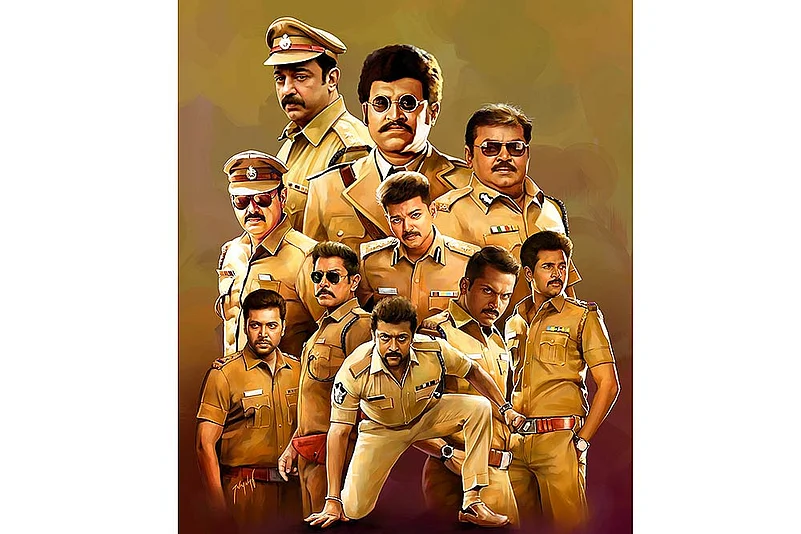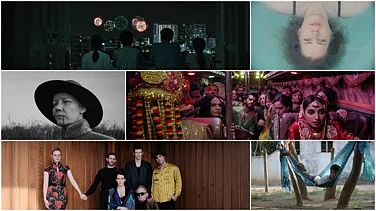“Naan police Illada, porukki,” (I am not a policeman, but a thug). Those bold words spoken defiantly by actor Vikram keep resonating as he portrays DCP Aarusaamy in the Tamil blockbuster Saamy. Following a tradition established by Clint Eastwood’s Harry Callahan in the Dirty Harry (1971-88) movies, the hero lives up to his own description, adopting various underhand methods to bring down the criminal-political empire of the villain Perumal Pichai.
The 2003 movie was the first of the five police-as-hero movies that director Hari became famous for. Later, his three movies under the Singam title had actor Surya play Duraisingam, the marauding cop, inspiring a Hindi remake with Ajay Devgn in the lead.
After creating the most trigger-happy cop in Tamil cinema history, it came as a surprise when Hari, in the light of the recent Sattankulam police torture deaths, regretted making those films that glorified policemen. “The only way is to punish all those involved with the highest sentence. The violation by some policemen has brought dishonour upon the entire force. I am deeply saddened today for having made five films glorifying the police,” he had observed.

Vikram flexes his muscle in Saamy 2
Do Hari’s words mark a reset in Tamil cinema, triggered by the horrific Sattankulam deaths, where two traders, a father and son duo, were tortured in police custody and who died on June 22-23? Will there be a relook at police centric movies, especially those that show the protagonist on a mad, adrenalin-fuelled rampage while putting down crime? “The manner in which the hero dons his police role may be toned down. When this incident of police torture is fresh in the minds of public, no director may risk showing a trigger-happy police officer as hero. We have to wait and watch for the first police movie to hit the screen after the lockdown,” said G. Dhananjayan, producer and film historian. At the end of Singam 3, Hari had indicated that the super cop would return soon. He refused to comment if he is nursing second thoughts about Singam 4.
For an industry that spawned a spate of police-hero films over the decades—actors Vijayakanth and Arjun churned out dozens in the ’80s and ’90s—toning down the macho image of the hero, especially when he is in khakis, could be challenging. Then there is the matter of cinematic hyperbole: in the Singam films, Surya’s Duraisingam, an IPS officer, has a fearsome upper-cut that is equated with that of a lion’s furious blow—at least the graphics made sure of that.
Hari’s cop hero had more than a mere licence to kill. He could operate across states, even international boundaries; effortlessly switching between Tamil Nadu police, CBI and Andhra police. Though studded with impossible action scenes and loud one-liners, those three movies etched the image of the ultimate action cop in the minds of viewers. Singam was shown as being fully justified in meting out instant justice—he had to, since arrayed against him was a bunch of powerful and politically connected villains, with even central ministers weighing in on the side of the villains.
Around the same time, Gautham Menon’s stylish portrayal of police officers—all encounter specialists—set a new benchmark for police oriented films. These had intelligent plots, no over-the-top speechifying and convincing acting by Surya, Kamal Haasan and Ajith. The movies actually cajoled youngsters to take up the police as a career. “Fifteen young police officers who I met recently told me that they were inspired to join the IPS after seeing my Kaakha Kaakha (Protect, Protect) and Vettaiyaadu Vilyaadu (Hunt and Play) that had heroes playing police officers,” reveals Gautham. He describes the Sattankulam incident as reprehensible, but refused to view the police force only through that lens. The leadership failure of one police station cannot become the broad brush to paint the entire police force as villainous, he argues.
Rather than depend on super-heroic policemen, some directors have actually recreated the sweat, blood and boredom of real-life cops even while scoring box office success. Theeran Adhigaram Ondru (Theeran, Chapter One, 2017), depicted the real life hunt for a dacoit gang from Rajasthan by a dedicated team of Tamil Nadu policemen. “The legwork, the arduous travel and frustration that the investigating officer and his team undergo were captured by the movie quite authentically which also contributed to its success. The trudge to various states to find the match for a single fingerprint reflected how much groundwork goes into police investigations. We need more such police stories to be shown as movies,” says former DGP S.R. Jangid, who had supervised the actual investigation and was consulted by Theeran’s director, H. Vinoth.
“Since the commercial aspect of cinema still hovers around the hero, we had to accommodate certain scenes to project the hero (actor Karti) through muscular action sequences and include a romantic angle. Otherwise, Theeran’s script stuck to the actual events and geography—the chase in the arid deserts, the language divide faced by the sleuths, the history of these gangs and the local support they received. Also, barring two encounter deaths, the other accused get punished by the courts; finally, the team leader gets shunted to an inconsequential post after he gets the job done—all these details mirror reality,” Vinoth recalls.
Stretching such realism to its unflinching, real-life truths is Vettrimaran, a two-time national award-winning director, who projects the stark nakedness of custodial violence and a staged police encounter in his award-winning film Visaranai (Interrogation). He describes the tendency to portray custodial violence and encounters as instant justice as a universal phenomenon in world cinema. “When the Hyderabad encounters happened last year, we celebrated the killings of the accused—vigilante films are a big reason for this,” he observes, suggesting that scriptwriters and heroes should shun such scenes.
But Gautham Menon counters that films borrow stories for police encounters from actual events and public adulation of the same. He points to the recent encounter killing of Vikas Dubey, the UP gangster and how an entire village in Tamil Nadu’s Salem district was celebrating Dinesh Kumar, the Kanpur Special SP who led the operation, since he hailed from the village. “Rather than celebration, it is personal loss that gets portrayed in my films. In all my three police movies, the same encounter cops are shown paying a heavy price for doing their job--they lose loved ones to reprisals by the gangsters. It is never a one-sided blitz by the cops,” he says. Also, when vigilantism gets overdone, like in Rajinikanth’s latest film, Darbar, audience response turns lukewarm, proving that cop movies also need to get their formula right to succeed.
Film critic Sreedhar Pillai notes that Tamils’ tendency to hero worship had made police officers like Walter Dawaram or K. Vijayakumar, who had hunted down forest brigand Veerappan, and the likes of S.R. Jangid as star cops. “So the Tamil film hero not only incorporated their exploits but even added a few more layers to shape his own action hero image.” And at least one police role would have played a key role in boosting every top hero’s career graph, he adds.
It does not require a khaki uniform for a hero to justify his daredevilry, says Gautham. “The Tamil cinema hero can do whatever he wants without being a police officer. He can avenge his sister’s rapist or killer using an aruval (sickle), but if he uses a revolver as a police officer to gun down a criminal how does it become wrong?” he asks. True, the same Vettriamaran, who runs down police encounters, glorifies gangster violence with relish in his film Vada Chennai (North Chennai, 2018) and revenge killing in his 2019 film Asuran (Demon), though in the latter he cloaks it as a fight back by oppressed Dalits.
The after effects of the Sattankulam incident on police stories in Tamil cinema may see a gradual weakening as public memory fades. “Whether one likes it or not, the vigilante police officer remains one of easiest ways to depict an action hero in Tamil cinema. Films with police themes have a decent collection and the larger than life image of the hero comes in handy. Ultimately, a hero looking for a quick hit would love to don the khaki and grab that gun,” observes Vinoth.
By G.C. Shekhar in Chennai


























